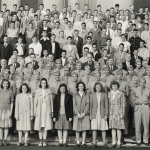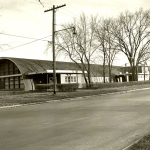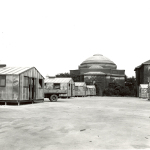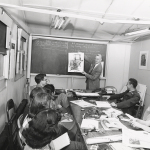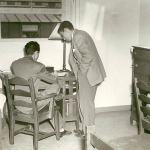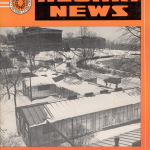Syracuse University is steeped in historical commitments that serve our nation’s veterans. In 2014, Chancellor and President Kent Syverud reaffirmed SU’s commitment to become the best place for veterans. The Office of Veterans and Military Affairs was formed to spearhead this mission.
News
Veterans at Syracuse University
Syracuse has been a leader in education for veterans ever since we helped champion the 1944 G.I. Bill. Yet, we are more committed than ever to our veterans on campus, looking to provide you with a smooth transition from service into the classroom with a dedicated community of support.
Military-Connected Students
Looking to take courses part-time, enroll in one of our traditional degree programs, or are being assigned to one of our military programs? Syracuse University is proud to have you as part of our community – we are devoted to providing you the support systems you need here on campus to succeed as an SU student.
The Five People every Student Vet on Campus Should Say Hello to
As a new student on campus, or maybe someone who has been around but not yet tapped into the resources the university has for the veteran and military community on campus, there are certain key people you should acquaint yourself with. They come from different centers on campus, can make your time at school easier, and they can provide many opportunities. It is helpful to have friends who can tell you how to navigate the ups and downs of university life as a student in a civilian world. All it takes is to say hello!
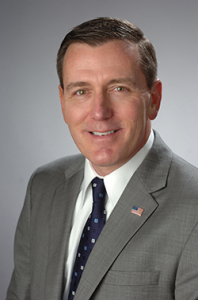 Ron Novack | jrnovack@syr.edu
Ron Novack | jrnovack@syr.edu
Executive Director – Office of Veteran and Military Affairs
Ron served in numerous command and staff positions in the military for 32 years when he finally retired as a Colonel in 2014. He currently serves as the Executive Director of Veteran and Military Affairs at Syracuse University and is responsible for developing veteran and military connected programs on campus. His goal is to empower the university’s military connected students, alumni, and staff. If you ever need any assistance or direction on how to accomplish something on campus, Ron is the person to speak to. If you’re lucky enough, Ron might give you a new nickname.
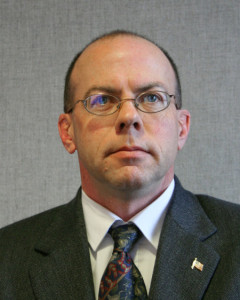 Keith Doss | veterans@syr.edu
Keith Doss | veterans@syr.edu
Veterans Advisor – Veterans Resource Center
Every student’s nightmare is tiptoeing through all the procedures, documentation, and paperwork that dominate school life, even more so when it comes to military-connected students. Keith has worked for years with students and other departments on campus to ease the hassles that student veterans have to go through when it comes to paperwork. He knows the ins and outs of what has to be done, when, and how. He is every student veteran’s superhero.
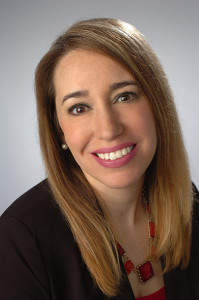 Jennifer Pluta | jrpluta@syr.edu
Jennifer Pluta | jrpluta@syr.edu
Assistant Director for Veteran and Military Family Members – OVMA and Career Services
Every student will come to a crossroads during his or her time at school when they start worrying about life after graduation and the inevitable job hunt. The unique advantage of being a veteran entering the civilian professional world is that there are many opportunities specially crafted for veterans. Jen is the person who will guide you through this phase, writing your resume, getting your LinkedIn up and running, and navigating that job search. Make sure you introduce yourself to her as soon as possible because her calendar will fill up.
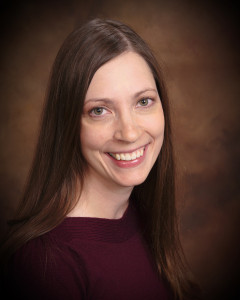 Kate Untiedt | Katherine.Untiedt@va.gov
Kate Untiedt | Katherine.Untiedt@va.gov
VetSuccess on Campus Counsellor – Department of Veterans Affairs (VA)
The VetSuccess on Campus (VSOC) program by the Department of Veterans Affairs (VA) helps Veterans, service members, and their qualified dependents succeed and thrive through a coordinated delivery of on-campus benefits assistance and counseling. Kate is our Vocational Rehabilitation Counselor (VRC). She can help with exploring career goals, connecting to VA benefits and services, and connecting to community resources.
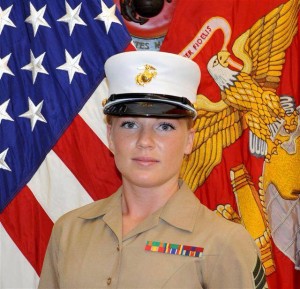 Jordan Robinson | jlrobi03@syr.edu
Jordan Robinson | jlrobi03@syr.edu
President – Student Veterans Organization at Syracuse University
Jordan is a senior and a student veteran who also happens to be the president of the Student Veterans Organization. She is your battle buddy when it comes to crossing the university war field. She understands what you are going through as she has been in the same position and will do everything in her power to help you along the way. Introduce yourself!
Syracuse University’s Student Veterans Organization Nationally Recognized
Syracuse University’s SVO is Named Chapter of the Month for September by Student Veterans of America
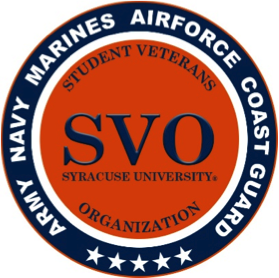 Syracuse University’s Student Veterans Organization (SVO) has earned the distinction of being named Student Veterans of America’s national chapter of the month for September 2015. View announcement on the Student Veterans of America (SVA) website.
Syracuse University’s Student Veterans Organization (SVO) has earned the distinction of being named Student Veterans of America’s national chapter of the month for September 2015. View announcement on the Student Veterans of America (SVA) website.
One of the main pillars of Student Veterans of America (SVA) is the peer-to-peer support model. The idea is that veterans should benefit from the advancements by those who share similar experiences. According to the SVA, the Syracuse University Student Veterans Organization embodies that culture by bringing chapters together for programs and efforts that benefit not only veterans attending Syracuse but also veterans who are associated with other organizations and institutions.
“We are incredibly humbled and proud to be nominated for the SVA Chapter of the Month for September,” said Jordan Robinson, President of Syracuse University’s Student Veterans Organization; Public Diplomacy Graduate Student, S.I. Newhouse School of Public Communications. “Through hard work and dedication, our team and its leaders have proven that we are deserving of this recognition for not only giving a voice to veterans issues, but for also helping to enrich the lives and futures of veterans in our communities through networking, outreach, and events. It is truly a joy to see the impact we have made in the past few months and we can only hope to be a model for other Student Veterans Organizations to follow.”
In the spring of 2015 alone, the Syracuse University SVO held their 2015 Student Veterans Ball and an inaugural student veteran networking event. The guest list for these two events featured student veterans from all surrounding colleges in the Central New York area. Attendees also included representatives from Ernst & Young, GE, Macy’s, IBM and various Central New York Veteran Support Organizations to name a few. Syracuse made a commendable effort to support the community and SVA stands for such efforts. The Syracuse University SVO was able to raise money for sponsorships and partially allocated that to offer scholarships for students.
The Syracuse University SVO looks to continue their outstanding work in the upcoming school year, in support of Chancellor Kent Syverud’s commitment to making Syracuse University the nation’s “best” institution for military-connected students. Their immediate plans, focused on providing resources, support and advocacy, include holding an orientation for new students and a meet and greet BBQ, and contributing to the efforts of Move Along – an organization focused on the mission of enhancing the abilities of individuals who have medically diagnosed limitations.
According to Vice Chancellor for Veteran and Military Affairs Mike Haynie, “Our Student Veterans Organization is well-deserving of this recognition. The SVO and its members are highly visible on campus and have been instrumental in integrating veterans into the Syracuse University community, which pays dividends for all our students.”
About the Syracuse University Student Veterans Organization (SVO):
The mission of the Syracuse University Student Veterans Organization (SVO) is to provide information resources and advocacy in support of all Syracuse University student veterans and to assist them toward graduation. The organization aims to increase awareness of and solutions to student veterans’ educational matters. Organizational members also actively participate on campus as well as within the Syracuse community. Syracuse University students, faculty members, and alumni with veteran status are always welcome.
About Student Veterans of America (SVA):
Today’s veterans face numerous obstacles in their path of attaining a college degree. These challenges range from a missing sense of camaraderie to feeling like an outsider amongst 18 year old traditional students to a lack of understanding by university faculty. When coupled with the visible and invisible wounds of war, a college degree can be an elusive goal for men and women returning from military service. Student Veterans of America (SVA) makes that goal a reality.
SVA is a 501(c) (3) coalition of student veterans groups on college campuses across the globe. These member chapters are the “boots on the ground” that help veterans reintegrate into campus life and succeed academically. Each chapter must be an officially recognized student group by their university or college and provide a peer-to-peer network for veterans who are attending the school. Additionally, chapters often coordinate campus activities, provide pre-professional networking, and generally provide a touchstone for student veterans in higher education.
About The Office of Veteran and Military Affairs (OVMA) at Syracuse University:
The Office of Veteran and Military Affairs (OVMA) serves as Syracuse University’s single point of entry for all veteran and military related programs and initiatives. It collaborates and coordinates with all stakeholders to best serve veterans, military connected students, and military family members who are students or employees at Syracuse University. For more information about the Office of Veteran and Military Affairs, visit https://veterans.syracuse.edu.
Enduring Commitment to Veterans
Syracuse University is proud of its historical commitment to serving our nation’s veterans. In 2014, Chancellor and President Kent Syverud reaffirmed SU’s commitment to become “the best place for veterans.” The Office of Veterans and Military Affairs was formed to spearhead this mission.
Download a PDF of the Timeline of Veterans at Syracuse.
Historic Overview
World War I
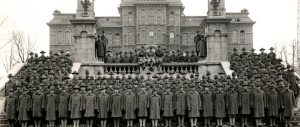
Syracuse University’s commitment to veterans and military students goes back at least as far as World War I, when we established a Students Army Training Corps (SATC). In the summer and fall of 1918, the Students Army Training Corps, part of a federal government military training program, dominated much of life on campus. Winchell Hall, Archbold Gymnasium, and fraternity and sorority houses were converted to barracks. The University built a large mess hall between Sims and Bowne Halls. Members of the SATC took basic training and classes in auto mechanics, telegraphy, and carpentry as well as surveying, foreign languages, and government. Due to the Armistice, the Corps was demobilized in December of 1918, but it is estimated over a thousand men received training at Syracuse University during those brief months. These glass plate negatives show Corps members involved in various activities, such as constructing buildings and working in carpentry and telegraphy classes.
Army ROTC
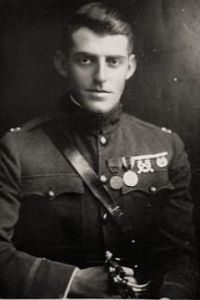
Syracuse University’s Army ROTC Stalwart Battalion traces its lineage to the Students Army Training Corps. The U.S. War Department reorganized the SATC into the Reserve Officers Training Corps (ROTC) in 1919 and established a permanent military department at Syracuse University that year.
Colonel Sidney F. Mashbir, the first ROTC commander at Syracuse University, wrote “it should be the aim of Syracuse University to maintain one or more units of the Reserve Officers Training Corps (ROTC) in order that in time of national emergency there may be a sufficient number of educated men, trained in Military Science and Tactics, to officer and lead intelligently the units of the large armies upon which the safety of the country will depend.”
Photo Gallery from the Syracuse University Archives
World War II
 The Servicemen’s Readjustment Act of 1944 – better known as the GI Bill – was one of the most significant pieces of legislation ever enacted by the United States Congress. Along with other provisions, it offered a college education to millions of returning veterans, thus opening new opportunities for them and their families, changing the shape of American society and public life, and transforming the very nature of higher education.The response to the bill was far greater than anyone had predicted. Between 1945 and 1950, the GI Bill supported some 2.3 million students, most of whom would never have been able to get a college education without it.
The Servicemen’s Readjustment Act of 1944 – better known as the GI Bill – was one of the most significant pieces of legislation ever enacted by the United States Congress. Along with other provisions, it offered a college education to millions of returning veterans, thus opening new opportunities for them and their families, changing the shape of American society and public life, and transforming the very nature of higher education.The response to the bill was far greater than anyone had predicted. Between 1945 and 1950, the GI Bill supported some 2.3 million students, most of whom would never have been able to get a college education without it.
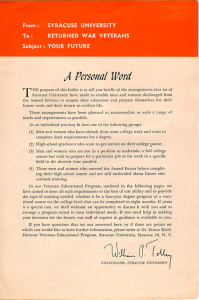
No university in the country was more closely identified with the GI Bill than Syracuse. Chancellor William P. Tolley served on the Presidential committee whose proposal formed the basis of the legislation. Taking the lead, Tolley also announced Syracuse’s “uniform admissions program,” promising everyone entering the service that there would be places waiting for them at Syracuse when they returned. And when they did return, Syracuse was as good as its word. Although still a small university by national standards, SU ranked first in New York State and 17th in the country in veteran enrollment.
Those years were not easy for anyone – not for the veterans, who were eager (and sometimes impatient) to make up for lost time, and not for the University, which was faced with challenges beyond anything in its history.
Space was at a premium. More than 600 prefab buildings, old barracks, Quonset huts, and trailers covered the campus and surrounding areas. Even so, classrooms were crowded and housing problems were legendary. New programs and curricula had to be developed and social rules had to change. The vets had to adjust to college life, and the students who were already here had to adjust to the vets, whose attitudes were different and whose numbers were overwhelming.
This exhibition, compiled from the University’s Archives and materials contributed by alumni, documents the fact that all those things were accomplished. They were accomplished in what came to be known as Syracuse’s “Can Do Spirit” that prevailed among faculty, staff, and students alike. That spirit of innovation, commitment, and caring – born during the years between 1946 and 1950 – defined a new Syracuse University and set its course to the future. This information is provided by the Syracuse University Archives.
Air Force ROTC
 Syracuse University’s AFROTC Detachment 535 was established for the 1946-1947 academic year in accordance with US War Department General Order 124. Syracuse is one of the original 77 Air ROTC units established in 1946 by then Chief of Staff of the United States Army Dwight D. Eisenhower. It became known as Air Force ROTC after the Air Force was designated a separate service in 1947.
Syracuse University’s AFROTC Detachment 535 was established for the 1946-1947 academic year in accordance with US War Department General Order 124. Syracuse is one of the original 77 Air ROTC units established in 1946 by then Chief of Staff of the United States Army Dwight D. Eisenhower. It became known as Air Force ROTC after the Air Force was designated a separate service in 1947.
Contract Training Programs
Syracuse University has continued serving the military through offering several contract training programs for military personnel.
Air Force Institute of Technology (AFIT) Language Program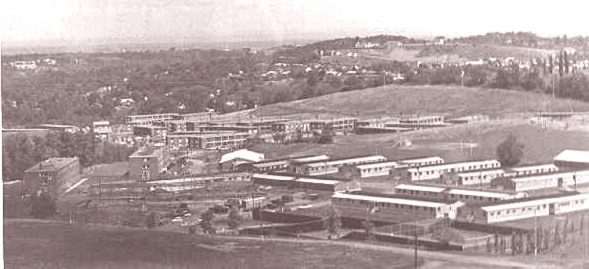
In 1951 Syracuse University contracted with the US Air Force Institute of Technology to establish the first Russian language training program for airmen run by a civilian institution. Hundreds of enlisted airmen were trained in intensive 6- to 12-month courses in Russian and other East European Slavic languages until 1971. It operated from 17 aluminum-clad prefabricated wood buildings (M-0 through M-16) along what is now Lambreth Lane on South Campus. Eight buildings were used as barracks housing for enlisted airmen assigned to AFIT Detachment One at Skytop.
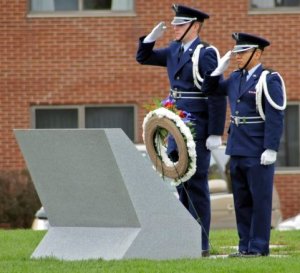
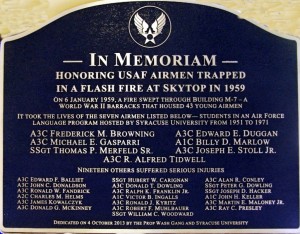
In Memoriam
During the early morning hours of Jan. 6, 1959, fire broke out in barracks M-7, which housed 43 airmen. The fire spread through the wood structure quickly. Seven airmen died in the fire and 19 were hospitalized. A memorial plaque to honor those lost and injured in the fire was installed on October 4, 2013. The memorial was a joint project of Syracuse University and a group of Air Force Security Service airborne reconnaissance veterans known as the Prop Wash Gang.
Enduring Partnerships
We currently operate four military contract programs that result in students obtaining graduate degrees. The programs are offered in Comptrollership, Information Studies, Supply Chain Management, and Visual Journalism. More information about these programs can be found here.
In addition to degree-granting programs, Syracuse has a number of military focused offerings such as the following:
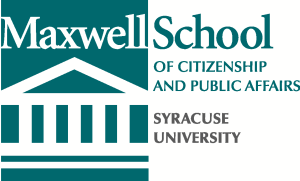 The National Securities Studies (NSS) was founded in 1996 and is headquartered at top ranked Syracuse University’s Maxwell School of Citizenship and Public Affairs. It is a premier professional development program that offers executive education courses for senior civilian and military leaders who are responsible for the national security interests of their respective organizations.
The National Securities Studies (NSS) was founded in 1996 and is headquartered at top ranked Syracuse University’s Maxwell School of Citizenship and Public Affairs. It is a premier professional development program that offers executive education courses for senior civilian and military leaders who are responsible for the national security interests of their respective organizations.
 The Institute for National Security and Counterterrorism (INSCT) was established in 2003. It is a collaboration between the College of Law and the Maxwell School of Citizenship and Public Affairs.
The Institute for National Security and Counterterrorism (INSCT) was established in 2003. It is a collaboration between the College of Law and the Maxwell School of Citizenship and Public Affairs.
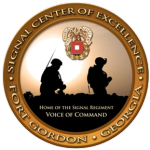 A U.S. Army Signal Center Partnership was established between the iSchool at Syracuse University and the U.S. Army Signal School at the Cyber Center of Excellence (SIGCEN) to allow soldiers to transfer 9 to 15 credits from SIGCEN to the iSchool and complete the remaining requirements online for a master’s degree in Information Management or Telecommunications and Network Management.
A U.S. Army Signal Center Partnership was established between the iSchool at Syracuse University and the U.S. Army Signal School at the Cyber Center of Excellence (SIGCEN) to allow soldiers to transfer 9 to 15 credits from SIGCEN to the iSchool and complete the remaining requirements online for a master’s degree in Information Management or Telecommunications and Network Management.
Recognizing that a new generation of veterans would be entering the university, Syracuse University has launched the following initiatives to serve their needs:
 The Veterans Resource Center was opened in July 2009 to assist prospective and current students with Veterans Administration and University business matters and provide a welcoming space for veterans on campus. The office and Veterans Lounge is located at 700 University Ave.
The Veterans Resource Center was opened in July 2009 to assist prospective and current students with Veterans Administration and University business matters and provide a welcoming space for veterans on campus. The office and Veterans Lounge is located at 700 University Ave.
![]() The Syracuse Veteran’s Writers Group was founded in 2010 to help veterans write stories of life in and out of the military.
The Syracuse Veteran’s Writers Group was founded in 2010 to help veterans write stories of life in and out of the military.
 The Institute for Veterans and Military Families (IVMF) was founded in June 2011. It is the first national center in higher education to focus on the social, economic, education and policy issues affecting veterans and their families post-service.
The Institute for Veterans and Military Families (IVMF) was founded in June 2011. It is the first national center in higher education to focus on the social, economic, education and policy issues affecting veterans and their families post-service.
 The College of Law opened the Veterans Legal Clinic on January 8, 2015. The Clinic will benefit our veterans and community by assisting with VA claims, representing clients in VA Claim appeals, and helping veterans in upgrading discharges. Priority status will also be given to veterans in existing Clinics, such as Family Law, Bankruptcy, Criminal Defense, Disability Law, Elder Law, Tax Law, and Consumer Law.
The College of Law opened the Veterans Legal Clinic on January 8, 2015. The Clinic will benefit our veterans and community by assisting with VA claims, representing clients in VA Claim appeals, and helping veterans in upgrading discharges. Priority status will also be given to veterans in existing Clinics, such as Family Law, Bankruptcy, Criminal Defense, Disability Law, Elder Law, Tax Law, and Consumer Law.

The Office of Veteran and Military Affairs was established on January 19, 2015, to serve as Syracuse University’s single point of entry for all veteran and military related programs and initiatives. It collaborates and coordinates with all stakeholders to best serve veterans, military connected students, and military family members at Syracuse University.
Syracuse University Medical School Idea Challenges the Status Quo (Commentary by Vice Chancellor Mike Haynie, PhD)
I came to Syracuse University in 2006 after 14 years of military service, understanding very little about SU and the Central New York community. However, early on I read Suzanne Mettler‘s “Soldiers to Citizens: The G.I. Bill and the Making of the Greatest Generation.” In this book Mettler tells of Syracuse University’s remarkable post-World War II contribution to the nation, empowering a generation of American veterans who would later earn the moniker of America’s “Greatest Generation.” Read More: http://www.syracuse.com/opinion/index.ssf/2015/08/syracuse_university_medical_school_idea_challenges_the_status_quo_commentary.html
U.S. NAVY Sailor Holds Reenlistment Ceremony at SU’s Carmelo Center
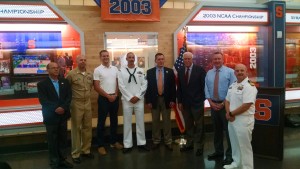 Syracuse University’s Office for Veteran and Military Affairs and the Department of Athletics were pleased to co-host the reenlistment ceremony for AE1 Justin D. Taylorcole, an active duty Navy Non-Commissioned Officer, on Thursday, July 30, at the Carmelo K. Anthony Basketball Center.
Syracuse University’s Office for Veteran and Military Affairs and the Department of Athletics were pleased to co-host the reenlistment ceremony for AE1 Justin D. Taylorcole, an active duty Navy Non-Commissioned Officer, on Thursday, July 30, at the Carmelo K. Anthony Basketball Center.
Taylorcole, currently stationed in San Diego, Cal., is originally from Lindley, N.Y. (located in the Southern Tier). He’s been in the Navy for 15 years, having enlisted in April 2000. In 2011, Taylorcole served on the newly commissioned, nuclear powered Aircraft Carrier, the USS George H. W. Bush (CVN-77), where he participated in the ship’s first two deployments. He is currently serving as an Instructor for the H-60 Seahawk Intermediate level electrical repair course molding the young minds of newly trained technicians fresh out of initial training at the Center for Naval Aviation Technical Training Unit North Island in San Diego, Cal.
“I am extremely thankful to Syracuse University for allowing me to have held my NAVY reenlistment ceremony at the Carmelo Center – a place where so much has been accomplished and celebrated,” said Taylorcole, an avid Syracuse University basketball fan who specifically reached out to the University in February 2015, requesting to hold this brief ceremony on campus.
According to Vice Chancellor for Veteran and Military Affairs Mike Haynie, “Holding such a ceremony for Taylorcole and his family on the Syracuse University campus demonstrates Syracuse University’s historic and continued commitment to our military, veterans and their families.”
Student Veteran Cynthia Kao-Johnson is making a Difference through Documentary Film at Syracuse University
 Documentary Film and History (DFH) graduate student Cynthia Kao-Johnson entered the military with a creative mind and left with the added benefits of skills and discipline. Now she wants to make a difference by igniting conversations about sensitive topics through her skills in documentary filmmaking.
Documentary Film and History (DFH) graduate student Cynthia Kao-Johnson entered the military with a creative mind and left with the added benefits of skills and discipline. Now she wants to make a difference by igniting conversations about sensitive topics through her skills in documentary filmmaking.
Kao-Johnson is a mother of three, an active-duty army wife, and a veteran who was in the Army Reserve from 2009 to 2013. According to her, being a reservist is living in both the civilian and the military world at the same time. She is used to having a civilian job while living in a military world. This gave her a unique advantage but it also created trouble. It was a surreal experience when she left that world. Not having to go to drills, or having people understand the acronyms that had become part of her vocabulary, took some getting used to. Feeling it was time to explore a different world, she enrolled in the DFH program at Syracuse University. Kao-Johnson came back to grad school searching for individual creativity, and to see how she could shape her storytelling in an artistic and provocative way.
“I was a broadcast journalist with the Air Force. I did a lot of camerawork. So I have a lot of creativity and a yearning for the freedom that documentary film-making affords.”
Throughout the year the program requires the students to put together a thesis film in order to complete the graduate program. Kao-Johnson’s film revolves around veterans’ experiences with Post Traumatic Stress Disorder (PTSD) and is a complete feature-length film. It deals with understanding PTSD and what veterans go through paralleled with how the community and outside world perceive it. She brings to life different war eras and how PTSD was experienced in earlier times because the actual term did not exist until 1980. Older vets sometimes did not even know they struggled from the disorder.
This topic is very close to Kao-Johnson as she personally struggled with PTSD herself. This encouraged her to integrate her story into the film as she felt that the veterans she was working with were making an impact on her life as she hoped she was making an impact on theirs. So the film to her is not just surveying different troops and chalking out a story, it is something much closer to heart. The film is set to be showcased at the end of May.
The Master’s of Documentary Film & History (DFH), a joint degree program between the Newhouse School of Public Communications and the Maxwell School of Citizenship and Public Affairs, is the only program in the country designed for students seeking the skills and knowledge to produce documentary films on historical subject matter.
Meghavaty Suresh served as a Graduate Assistant at the IVMF while pursuing a Master of Science in New Media Management from the S.I. Newhouse School of Public Communications at Syracuse University. She holds a Master’s in Management and Bachelor’s in Commerce from Mumbai University.
Major General Jerome Johnson – You Should Know His Story
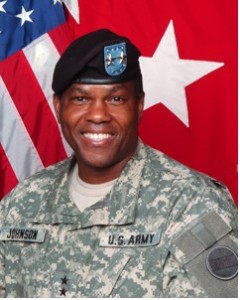 Major General Jerome Johnson is an alumnus of Syracuse University, and also a military veteran. You should know his story, because it’s a Syracuse University story – one that speaks to our past, our present, and our future.
Major General Jerome Johnson is an alumnus of Syracuse University, and also a military veteran. You should know his story, because it’s a Syracuse University story – one that speaks to our past, our present, and our future.
Born in rural Georgia in 1951, Johnson attended Fort Valley State University south of Macon, where he graduated with a Bachelor’s of Arts in Business Administration in 1973, received a commission in the United States Army as a second lieutenant, and met his future wife, Doris. While at Fort Valley State, Johnson was a member of the Phi Beta Kappa fraternity, and graduated cum laude and as salutatorian of his class. From 1973 to 1993, he held a number of different positions, each with different responsibilities. For example, his wide range of experiences stretched from his service as an action officer at the Total Army Personnel Center, a financial management officer at the 21st Support Command, and as a program analyst for the US Army Deputy Chief of Staff for Logistics.
In 1982, Johnson graduated from Syracuse University’s School of Management with a Master’s in Business Administration, following the historic trend of veterans attending SU for Master’s Degrees. While here at SU, Johnson graduated cum laude and as salutatorian of his class. After his time at SU and a one-year fellowship to the US Army Command and General Staff College, Johnson began to work in strategic issues, such as his position as the Chief of Staff and Support Operations Officer for the 3rd Corps Support Command at Fort Knox, Kentucky. Johnson would later serve in leadership positions with the 227th Maintenance Battalion, Eighth US Army in South Korea, the 29th Support Group of the 21st Theatre Army Area Command in Germany (and also served in Bosnia), and at the Army War Reserve Support Command in Rock Island, Illinois.
In 1999, Johnson became a transformative player in the reform of the Army War Reserve Support Command (AWRSPTCMD). Chosen as its Commanding General, Johnson helped transition AWRSPTCMD into the Field Support Command (FSC), which became the “one-stop-shop” for all US Army Materiel customers and consumers. His success at FSC led the Army to appoint him as the Director of Plans, Readiness, and Operations for the US Army Deputy Chief of Staff for Logistics at the Pentagon, in which he managed the logistics aspect of the response to the September 11, 2001 attacks as well as the early stages of US combat missions in Iraq and Afghanistan. After a similar three year position at the US Army Field Support Command, Johnson was appointed in 2007 as the Deputy Chief of Staff for Logistics (G-4) at the Army Forces Command (FORSCOM) at Fort McPherson in Georgia. While at FORSCOM, Johnson was responsible for all logistical support for the more than 800,000 active and reserve Army personnel as well as 40,000 Department of the Army civilian personnel.
Johnson’s career has certainly been an impressive one. Not only have his positions been of major significance, but he’s also been awarded the Distinguished Service Medal with one oak leaf cluster, the Legion of Merit with two oak leaf clusters, and the Meritorious Service Medal with four oak leaf clusters.
Following Johnson’s retirement in 2009, he and his wife Doris are retired in the Washington DC area, where he is the Vice President for Operations and Logistics at Honeywell Technical Solutions.
Jerome Johnson is an alumnus of Syracuse University and a veteran of the U.S. military. You should know his story.

